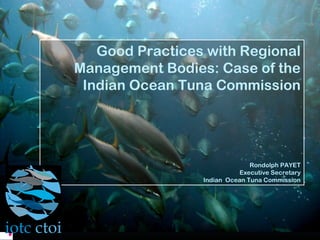
Good Practices with Regional Management Bodies: Case of the Indian Ocean Tuna Commission
- 1. Good Practices with Regional Management Bodies: Case of the Indian Ocean Tuna Commission Rondolph PAYET Executive Secretary Indian Ocean Tuna Commission
- 2. Established in 1996 , it is the only RFMO based in the IO, and the only tuna RFMO under the FAO of United Nations framework. Headquarters – based in Victoria, Seychelles 31 full Member States and 2 Cooperating States Most of the tuna fishing nations are members (over 80-90% of the catch). The objective of the IOTC is to promote cooperation among its Members to ensure, through appropriate management, the conservation and optimum utilization of stocks covered by the Agreement and to encourage sustainable development of related fisheries Performance review (2nd ) IOTC
- 3. Decisions are binding by majority rule. Decisions (Resolutions) taken collectively but implemented at national Level. Objection procedures • Most CMMs adopted by the IOTC apply throughout the entire competence area, including coastal State EEZs, and thus potentially affect coastal States’ sovereign rights over the living resources in their EEZs as the CMM in some way or another restrict fishing activities. Countries must translate the Resolutions in national laws. Members make contribution's to the organisation ( GDP, Catch level, development status) Carry out capacity building activities IOTC
- 4. The structure of IOTC Commission (31+2 Member States decide on actions) Scientific Committee (advise on status) Scientific Committee (advise on status) Compliance Committee (advise on enforcement) Compliance Committee (advise on enforcement) Working Groups (scientific analysis) •Tropical Tunas •Billfish •Temperate Tunas •Ecosystems •Data Collection •Methods Working Groups (scientific analysis) •Tropical Tunas •Billfish •Temperate Tunas •Ecosystems •Data Collection •Methods Secretariat (support all processes at all levels IGO and NGOIGO and NGO
- 6. • Yellowfin, skipjack, bigeye, albacore tunas and swordfish the main species. •Neritic tunas important at a sub-regional level. •16 Species in total + sharks, seasbirds, whales ( associated species). • Virtually all the transboundary stocks of importance in the IO. • About 40% of catches in the high-seas. What are the species under IOTC mandate?
- 7. Catch 1973-2012 0.0 0.4 0.8 1.2 1.6 1973 1974 1975 1976 1977 1978 1979 1980 1981 1982 1983 1984 1985 1986 1987 1988 1989 1990 1991 1992 1993 1994 1995 1996 1997 1998 1999 2000 2001 2002 2003 2004 2005 2006 2007 2008 2009 2010 2011 2012 Millionsofmetrictons Catch IOTC Species 1973-2012 GUT COM BLT FRI KAW LOT SFA MLS BUM BLM SWO SKJ SBF ALB BET YFT Species Year Sum of Catch WS
- 8. Compliance Compliance Meter Compliant Partially Compliant Not Compliant Implementing year 2010 2011 2012 Compliance rate 25% 38% 46%
- 9. Compliance – where we are 2010 2011 2012 2012
- 10. Approaches – Science to Governance/Deci sion making
- 11. •Evaluation of uncertainty in the stock status, development of robust management strategies. •Precautionary approach •Incorporating ecosystem considerations into management decisions. •The development Management Strategy Evaluation for Harvest Control Rules. Better science to guide decision making:
- 12. What is Management Strategy Evaluation? •A strategic risk assessment tool •Prospective evaluation of alternative management strategies •Selection of management strategies that are most likely to meet management objectives and “robust” to major uncertainties •Two components • Consultative process • Technical implementation Management Strategy Evaluation and Harvest Control Rules
- 13. •Objectives • What the strategy is designed to achieve. •Monitoring •Assessment • Stock assessment or simple analysis •Harvest Control Rules or Decision rule • An agreed basis for using the output of monitoring to change/not change the level of fishing •Implementation • Management measures designed to achieve change in fishing mortality. Components of a Harvest Strategy
- 14. Development of Harvest Strategies for Conservation Measures •Evaluation of their performance against management objectives. •Understand their sensitivity and robustness to uncertainties •Use of simulation tools to explore the robustness of management options to uncertainties in the system •Compare the evolution of “real” and perceived systems to quantify errors and biases •To quantify the success at achieving pre-agreed objectives Management Strategy Evaluation and Harvest Control Rules
- 15. What is MSE
- 18. Challenges Sustaining Catch levels and Controlling fishing capacity Participation of developing countries Translation of the conservation and management measures into national laws Compliance to Conservation and management measures Managing the fisheries development aspirations of the developing/coastal states Financial contributions Distribution of the conservation burden and benefit is a critical challenge to the conservation and management of trans-boundary fish stocks - How to share the conservation burden
- 19. Implications for IW LEARN Projects/GEF – Marine Fisheries Perspectives Traditional Approach Science-based approach tends to drive the Strategy/institutional frameworks Alternative Approach Determine the strategy First ( a dialogue between the scientist/Decision-makers). Determine your decision rule ( what to do when X happens) Advise what science needs to address Implementation of management decision/monitoring and assessments. Performance Review of the Commissions/Authority
- 20. Area Beyond National Jurisdiction (ABNJ) Project – Tuna FAO (with WWF) implemented (GEF funded) – Support Tuna RFMOs improving science to management/governance Promote Sustainable management of tuna resources Strengthen Monitoring and surveillance of fisheries Reduce ecosystem aspects.
Notas do Editor
- Green Zone with high probability In case of not green zone, come back as quick as possible with high probability. Other Priorities (Social) Employment/stability of catch Maximum Economic Yield Vs Maximum Sustainable Yield. Expanding Fleet Capacity/ Opportunity (Industry) Conserving stocks for Intrinsic Benefits (Enviros)
- Participation of developing countries - now support through a meeting participation fund. Determining the distribution of the conservation burden and benefit is a critical challenge to the conservation and management of trans-boundary fish stocks. Given current levels of over- fishing and overcapacity in many trans-boundary fisheries, some or all participating States must necessarily reach a compromise with regard to their interests and carry some share of the conservation burden.
- In simple terms….
